-
Tips on how to avoid ransomware attacks
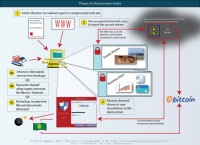
Individuals and businesses have become targets to a growing online fraud scheme known as ransomware. Ransomware is a form of malware used by cyber criminals to freeze your computer or mobile device, steal your data and demand that a “ransom” — typically anywhere from a couple of hundreds to thousands of dollars — be paid. The FBI, ransomware victims lost more than $18 million between April 2014 and June 2015.
-
-
Preparing for the worst case scenario
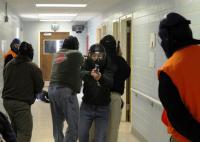
The number of incidents involving armed attackers (active shooter incidents) has been on the rise over recent years with attacks taking place around the world — from the United States to India, from Norway to France to Kenya. Control Risks says that its Active Shooter training helps increase awareness of the threat and, in the worst case scenario, how best they can protect themselves.
-
-
Trump calls for profiling of Muslims, surveillance of mosques
Providing more details about his response to the Orlando shooting, Donald Trump on Sunday proposed the profiling of Muslims by law enforcement, and the nation-wide implementing of a Muslim surveillance programs which was used for a while by the NYPD, but which was discontinued after it had failed to yield a single useful lead.
-
-
2015 global forced displacement breaks records
Wars and persecution have driven more people from their homes than at any time since the UN began keeping refugee records. A new, detailed study which tracks forced displacement worldwide found a total 65.3 million people were displaced at the end of 2015, compared to 59.5 million just twelve months earlier. The report found that, measured against the world’s population of 7.4 billion people, one in every 113 people globally is now either an asylum-seeker, internally displaced, or a refugee.
-
-
Tracking, analyzing how ISIS recruits through social media

A team of researchers has developed a model to identify behavioral patterns among serious online groups of ISIS supporters that could provide cyber police and other anti-terror watchdogs a roadmap to their activity and indicators when conditions are ripe for the onset of real-world attacks. The researchers apply the laws of physics to study how terrorist support groups grow online, and how law enforcement can track activities.
-
-
U.S. diplomats call for "targeted military air strikes" against Assad's government
More than fifty U.S. diplomats have circulated an internal memo to fellow Department of State employees, criticizing the administration’s policies in Syria and calling for air strikes against President Bashar al-Assad’s government forces. The “dissent channel cable” was signed by fifty-one mid-to high-level State Department officials involved in advising on Syria policy. The document calls for “targeted military air strikes” against Assad’s government.
-
-
ISIS has committed a genocide against the Yazidis: UN
ISIS has committed the crime of genocide as well as multiple crimes against humanity and war crimes against the Yazidis, thousands of whom are held captive in the Syrian Arab Republic where they are subjected to almost unimaginable horrors. A new UN report says ISIS has sought to destroy the Yazidis through killings, sexual slavery, enslavement, torture, and inhuman and degrading treatment and forcible transfer causing serious bodily and mental harm, and the infliction of conditions of life that bring about a slow death.
-
-
Former IDF general: Hezbollah could fire 1,200 rockets daily into Israel during next war
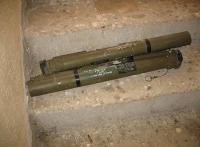
A former IDF general warned Israelis earlier this week that the next war with the Iran-backed Lebanese terror organization Hezbollah would lead to a barrage of rockets into Israel on an order of magnitude higher than anything Israel has yet faced. Major General (res.) Yitzhak Gershon said that the 2006 war between Israel and Hezbollah featured up to 160 rockets per day fired at Israel’s north. But given Hezbollah’s military buildup, “we need to expect up to 1,200 rockets in a day– it will be a completely different scenario from anything we’ve known.”
-
-
Labor MP killed near Leeds by gunman shouting “Britain First!”

Jo Cox, 41, a Labor MP for Batley and Spen, has been shot and stabbed to death Thursday by a man shouting “Britain First!” She was attacked outside a library in the town of Birstall, West Yorkshire. Cox has been campaigning for the United Kingdom to stay in the EU – the referendum on this question is to be held Thursday, 23 June. Britain First, founded in 2011, is a far-right political party campaigning against immigration, multiculturalism, and what it sees as the Islamization of Britain. Members of Britain First conduct what they call “Christian patrols” outside of mosques and the homes of Muslim leaders.
-
-
Jo Cox’s killer is a neo-Nazi with ties to U.S., South African White supremacist groups
Thomas Mair, the 52-year old Briton who on Thursday killed Jo Cox, the Labor MP, was a neo-Nazi with ties to U.S. and South African White supremacist groups. Mair has also purchased books from a U.S.-based neo-Nazi group, including manuals on how to build homemade guns and explosives. The police found a manual in his home on how to make a homemade pistol. Mair mail-ordered the books and manuals from National Vanguard Books in Hillsboro, West Virginia. The bookstore is owned by the National Alliance, which advocates the creation of an all-white homeland and the eradication of Jewish people.
-
-
The Orlando shooting: exploring the link between hate crimes and terrorism

Some are calling the mass shooting at an Orlando gay nightclub an act of terrorism. Others are calling it a hate crime against the LGBT community. President Obama declared it an “act of terror and an act of hate.” Can it be both? The Orlando tragedy demonstrates the importance of exploring difficult questions. For example, are terrorists who commit acts of hate and terrorists who target the government radicalized the same way? Are perpetrators motivated by far-right extremist views similar to those motivated by jihadist extremism? What factors helped push these perpetrators to violence, and what steps can be taken to stop it from occurring again? Answering these questions may help law enforcement identify, investigate, prosecute, and ideally thwart those who seek to turn to violence to achieve their goals.
-
-
“We don't have religious tests here”: Obama slams Trump’s call for singling out Muslims – including Muslim Americans -- for a different treatment
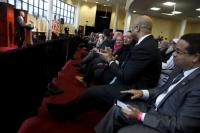
On Tuesday, following a meeting with the National Security Council, President Barack Obama delivered remarks on the U.S. fight against ISIS. Obama used the second part of his speech for a pointed, and compelling, lecture on how, during the current political season, Americans should be careful to take the measure of politicians whose proposals evince no grasp or appreciation of the country’s core values and founding principles. This careful consideration is required because, in the name of securing the country against terrorism, there are simplistic, even absurd, nostrums being recklessly put forth as a panacea.
-
-
Germans should watch for signs of radicalization among their acquaintances: German interior minister
The German and French interior ministers discuss cooperation between the two countries in the war in terror. German Interior Minister Thomas de Maizière has encouraged Germans to share evidence of radicalization. He said that radicalization of potential terrorists takes places not only online, but also often begins in a person’s social sphere.
-
-
Report: Hezbollah has more rockets than 27 NATO countries combined
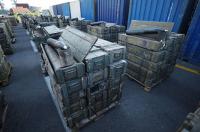
Any future war between Israel and Hezbollah will take a devastating toll on civilians due to the Iran-backed terrorist group’s practice of embedding its military assets in residential areas, military analysts say. Hezbollah currently has a stockpile of over 130,000 rockets, more than the combined arsenal of all NATO countries, with the exception of the United States.
-
-
Terrorism and tourism: what cities should do to prepare for an attack
Citizens of the U.S. and the world were deeply shocked and saddened when a gunman shot and killed about fifty patrons at an Orlando nightclub this past weekend. While the shooter’s primary targets were the people enjoying an evening out, a secondary object of such incidents is typically tourism, with the aim of terrorizing a population so much that people don’t travel there, thereby harming the economy. An examination of how cities and other destinations react to shootings and other situations that negatively affect tourism reveals that there are several important lessons about what cities can do to assure tourists they can maintain their safety. Destinations that take a greater leadership role and provide accurate, relevant, and timely information to their visitors are more likely to win in this zero sum game. Those that are unorganized or silent are more likely to lose. Ultimately, tourists vote with their pocketbooks, and a destination’s relative safety may determine where they take their next trip.
-
More headlines
The long view
What Does Netflix’s Drama “Adolescence” Tell Us About Incels and the Manosphere?
While Netflix’s psychological crime drama ‘Adolescence’ is a work of fiction, its themes offer insight into the very real and troubling rise of the incel and manosphere culture online.
A Shining Star in a Contentious Legacy: Could Marty Makary Be the Saving Grace of a Divisive Presidency?
While much of the Trump administration has sparked controversy, the FDA’s consumer-first reforms may be remembered as its brightest legacy. From AI-driven drug reviews to bans on artificial dyes, the FDA’s agenda resonates with the public in ways few Trump-era policies have.
The Center Can Hold — States’ Rights and Local Privilege in a Climate of Federal Overreach
As American institutions weather the storms of executive disruption, legal ambiguity, and polarized governance, we must reexamine what it means for “the center” to hold.
How to Reverse Nation’s Declining Birth Rate
Health experts urge policies that buoy families: lower living costs, affordable childcare, help for older parents who want more kids
Foundation for U.S. Breakthroughs Feels Shakier to Researchers
With each dollar of its grants, the National Institutes of Health —the world’s largest funder of biomedical research —generates, on average, $2.56 worth of economic activity across all 50 states. NIH grants also support more than 400,000 U.S. jobs, and have been a central force in establishing the country’s dominance in medical research. Waves of funding cuts and grant terminations under the second Trump administration are a threat to the U.S. status as driver of scientific progress, and to the nation’s economy.
The True Cost of Abandoning Science
“We now face a choice: to remain at the vanguard of scientific inquiry through sound investment, or to cede our leadership and watch others answer the big questions that have confounded humanity for millennia —and reap the rewards.”
